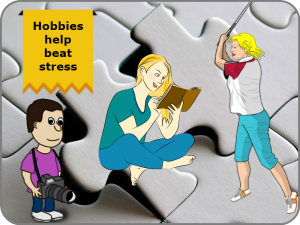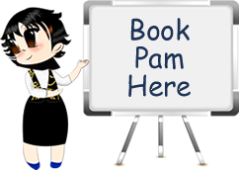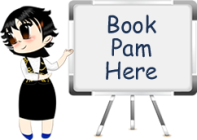The importance of hobbies and interests in beating stress
 Most of us pride ourselves on working so hard and effectively that we find we don’t have time to indulge our interests outside of work. What we forget is that these outside interests may well make us more productive inside. Not only that- research shows that people who have hobbies and interests are far more effective at beating stress when it strikes.
Most of us pride ourselves on working so hard and effectively that we find we don’t have time to indulge our interests outside of work. What we forget is that these outside interests may well make us more productive inside. Not only that- research shows that people who have hobbies and interests are far more effective at beating stress when it strikes.
When was the last time you took a whole day to read a book? When you go on holiday do you put your phone/tablet away and leave work things until your return? Do you have periods where you switch off from work entirely? Most important of all what do you do for FUN?
Having fun and beating stress
I am as bad as the next person. I haven’t had a proper holiday now for 4 years and have a stack of books I have been meaning to read by my bedside. However, this is somewhat offset by the fact that I travel for my speaking events and take a few days either before or after to explore where I am or lounge around near a beach. I also started a rule some time ago that on Sunday’s (unless imperative) I will not turn on my pc or look at my tablet which has freed up my time to stick my nose in a book and lose myself for a few hours.
Explore what you might enjoy. It might be going to the gym (yuk), it might be roaming the countryside and having a picnic, it might be taking up a new hobby (I’ve just taken up archaeology and am loving it). It could be anything just make sure it is not work related and makes you smile and relax.
The beauty of a hobby is that you can switch off from work demands and literally, “go somewhere else”. When you are absorbed in an activity your brain can focus on that activity alone and the other concerns literally get filed away. This is like a holiday for your brain and all those neurons that over fire during anxiety can rest.
A side benefit of having a hobby or interest is not just beating stress but warding off disease.
Research has suggested that combining good nutrition with mental, social and physical activities may have a greater benefit in maintaining or improving brain health than any single activity.
http://www.alz.org/brain-health/brain_health_overview.asp
 Stress is bad for your brain health and as you get older you may find yourself becoming forgetful or unable to focus. By giving your brain a break from the demands of your workload, you improve its cognitive ability and this can be helpful in not just beating stress overload but also in warding off diseases such as Alzheimer’s.
Stress is bad for your brain health and as you get older you may find yourself becoming forgetful or unable to focus. By giving your brain a break from the demands of your workload, you improve its cognitive ability and this can be helpful in not just beating stress overload but also in warding off diseases such as Alzheimer’s.
Making time for hobbies and beating stress is possible
And if you are still saying “I don’t have enough time” – yes you do. In a week, there are 168 hours of which you sleep 56 and 40 are normal business hours – that still leaves you 72 hours per week to do something else if you want to.
It does take planning and commitment and sometimes the best way to do this is to schedule your downtime. If your calendar looks full, find a slot each day/week that you block off just for “you time”.
Plan breaks between periods of activity to allow the business of the day to filter down to your subconscious (where lots of ideas and solutions lurk). I find that walking away from a problem for a while often helps a solution to present itself. So, engaging in a hobby for an hour- or just doing a crossword, reading a chapter of a book etc. allows your brain to rest and think through a problem in your subconscious while your conscious brain is having fun.
If you are a workaholic- you will find that after a while you become less effective. It is not “heroic” to keep pushing yourself through this- it is counter-productive. Beating stress is not an option- it can severely compromise your ability to function. So, do yourself a favour, step back, take some time out and when you return to your work you will be refreshed and more effective.

